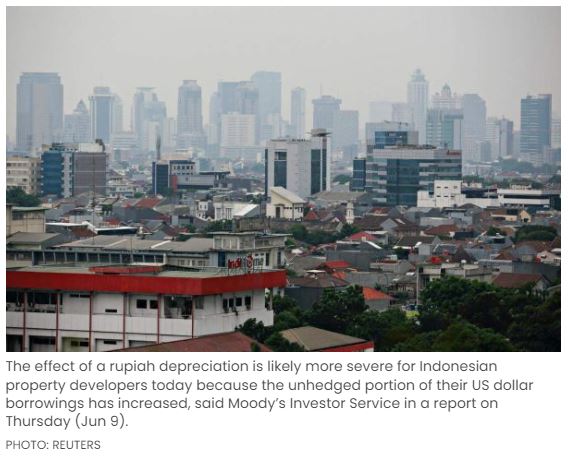High risk of rupiah depreciation likely to hurt Indonesia property developers: Moody’s
THE effect of a rupiah depreciation is likely more severe for Indonesian property developers today because the unhedged portion of their US dollar borrowings has increased, said Moody’s Investor Service in a report on Thursday (Jun 9).
Indonesian developers are exposed to foreign exchange risk as they have a large portion of US dollar debt but earn revenue in Indonesian rupiah. If the rupiah weakens, developers will have a weaker ability to service their US dollar debt obligations as the principal amounts and interest expense will increase in rupiah terms.
While the rupiah has been “relatively stable” against the US dollar over the past 12 to 18 months, Moody’s said foreign capital outflow due to a higher uncertainty over the global financial market may increase the risk of depreciation.
The research team also noted that 4 of the 6 developers it rates have left an increased proportion of their aggregated debt unhedged over the past 2 years. The developers have financial hedges in the form of non-deliverable call spread option facilities to protect the principal sum of their US dollar debt.
However, Moody’s said most of the rated developers do not have any US dollar debt maturities over the next 12 to 18 months.
Most will also have sufficient liquidity headroom to withstand higher interest costs, due to their larger cash holdings, stronger operating cash flows, or lower interest costs following debt exchanges over the past couple of years.
Of its rated developers, the research team expects Pakuwon Jati will be the most well-protected against a rupiah weakness due to its US dollar cash holdings of US$150 million.
Bumi Serpong also has a large rupiah cash balance that provides a sufficient buffer, and Modernland has no interest payment exposure in 2022.
Lippo Karawaci also has hedged interest payments on its US$417 million 2026 bonds, and Alam Sutera’s cash balance has increased while its interest cost fell after it exchanged its bonds in 2020.
Meanwhile, if the rupiah weakens to 17,000 against the US dollar, Moody’s expect Agung Podomoro would require external borrowings to supplement its liquidity.
Source: https://www.businesstimes.com.sg/asean-business/high-risk-of-rupiah-depreciation-likely-to-hurt-indonesia-property-developers-moodys


 Thailand
Thailand




